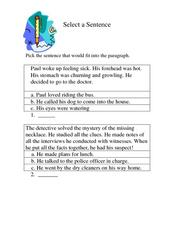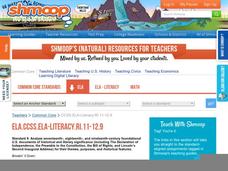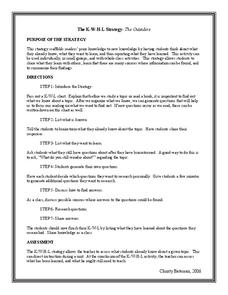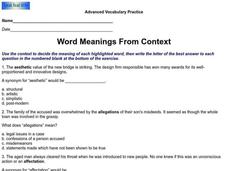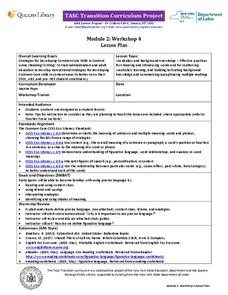Curated OER
Let's Spell Words Ending in -tion
Words with the -tion ending are the focus of this presentation. Learners read a series of words with this ending, practice spelling them, and read a sentence. This could be used at a center or as a whole-group activity.
Curated OER
Animals
Designed for a third grade Spanish class, this mini-lesson offers a look at animals and the sounds they make. First, the teacher will review the different sounds that animals make. Then, the whole class will read Miau and La vaca que...
Curated OER
Get Rid of "And"
Run-on sentences using and are all too common in our youngsters' writing. Have them read these different paragraphs to determine where they can remove some of the ands. Consider doing this activity as a whole class on the overhead or...
Curated OER
Rhyming Words
Using endings, such as -it, -id, and -ip, learners practice reading and spelling words. This is a simple and motivating way to have your kindergarten or first grade class practice important skills. This could be done in a whole group, or...
Curated OER
Letters and Sounds: ou
Review the ou sound with your second graders. Learners read a series of words containing the ou sound. It is a quick and easy way to delve into this topic. The resource could be used as a whole group or center activity.
Curated OER
Spelling Exercise
Have your class practice reading words with the ue sound. Learners read a list of words including blue, glue, and argue. For maximum effectiveness, this simple exploration could be augmented with a greater number of examples. It could be...
Curated OER
Staying on Topic: Select a Sentence
After reading sample paragraphs -- each with a topic sentence, conclusion, and 2 supporting details -- readers choose from among 3 possibilities another supporting sentence that fits the topic at hand. Only 2 examples are given, so this...
Curated OER
“Everyday Use,” Alice Walker: Questions for Discussion
Should treasured family heirlooms be used or preserved? This resource provides readers with an opportunity to examine the actions of characters in Alice Walker’s short story, as well as their own sense of heritage. The questions could be...
Curated OER
ABC Order- Missing Letters
Elementary learners use this letter puzzle to review the alphabet! Five letters are missing (one from each row), and learners have to write which one belongs there. When your class is finished, have the whole group read through the...
Curated OER
Find the Letters
Help beginning readers recognize that whole words are made up of individual letters. They examine a set of lowercase letters and circle the ones they find in a CVC word. Learners do this for the words bin and cup.
Shmoop
ELA.CCSS.ELA-Literacy.RI.11-12.9
Guided by close-reading questions, groups examine the similarities and differences between the Declaration of Independence and the Bill of Rights. In addition, they look at how the principles are presented in these two foundational US...
Curated OER
Harry Potter And The Prisoner of Azkaban: KWHL Strategy
J.K. Rowling's world of wizards and magic focuses on some topics that relate to our own society, especially in Harry Potter and the Prisoner of Azkaban. Have kids complete a KWHL chart (what they know, what they want to know, how...
Curated OER
The Season of Snow...and Learning
Winter-themed language arts lessons that will keep pupils reading and writing.
Smithsonian Institution
Water/Ways: The Poetry of Science
Water is the source of life. It appears in poetry in both peaceful and torrential descriptions; it appears in earth science in its liquid, gaseous, and solid states. Combine these interpretations of our planet's most precious and...
Curated OER
The Outsiders: The K-W-H-L Strategy
What does your class know about the 1960s? Introduce your unit on S.E. Hinton's The Outsiders with a K-W-H-L chart, which encourages kids to list what they already know about the time period, what they would like to know, how they...
Curated OER
Twelfth Night: The K-W-H-L Strategy
Readers of Twelfth Night use a KWHL chart to record information about what they know about Shakespeare's play, what they want to find out, how they plan on finding this information, and what they have learned or still want to learn about...
Prestwick House
1984
Readers of Nineteen Eighty-Four use their answers to questions about George Orwell's tale to complete a crossword puzzle.
PBS
Stories of Painkiller Addiction: Prescription Drug Abuse Awareness Campaign
The I-STOP law was designed to regulate the distribution and tracking of prescription drugs. After reading an article about its signing and implementation, middle and high schoolers work together to come up with their own ideas for an...
Curated OER
Word Meanings from Context
Here is a vocabulary worksheet in which your scholars determine the meaning of 10 words using context clues from short readings. They choose from among four words and write their answers on the blank lines at the bottom of the page. They...
Curated OER
Mental Images in Reading Comprehension
Students use textual clues to create mental images and interpret characters moods and actions. They visualize the setting, characters and events.
Curated OER
Phonics: Decoding Words in Connected Text
Introduce your little ones to the wonders of phonemic decoding. They practice along as you sound out simple cvc words in the context of a sentence.
Curated OER
Hoot: Anticipation Guide
Should companies be able to build wherever they want? Are animals worth protecting? Explore the literary themes from Carl Hiaasen's Hoot with an anticipation guide. Kids read ten statements and decide if they agree or disagree, then...
New York State Education Department
TASC Transition Curriculum: Workshop 4
Why is it important to use precise language? Participants explore this question in the fourth activity in a series of 15 on effective instruction. Perfect for all content areas, the activity promotes appropriate language choice through...
Conneticut Department of Education
Instructional Strategies That Facilitate Learning Across Content Areas
Imagine 28 instructional strategies, appropriate for all subject areas and all grade levels. Directed Reading-Thinking Activities (DRTA), Question-Answer Relationship (QAR) activities, KWL charts, comparison matrixes, classification...






